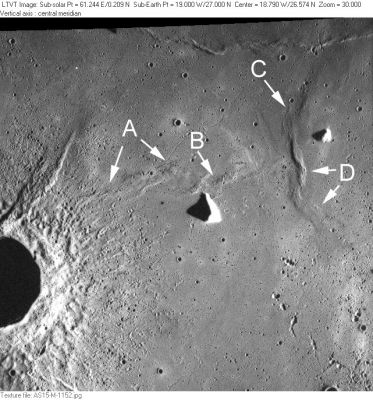Difference between revisions of "Dorsa Stille"
| Line 6: | Line 6: | ||
|} | |} | ||
<div id="toc"> | <div id="toc"> | ||
| − | [http://www.lpod.org/coppermine/albums/userpics/Dorsa-Stille_AS15-M-1152_LTVT.JPG [[Image: | + | [http://www.lpod.org/coppermine/albums/userpics/Dorsa-Stille_AS15-M-1152_LTVT.JPG [[Image:Normal_Dorsa-Stille_AS15-M-1152_LTVT.JPG|external image normal_Dorsa-Stille_AS15-M-1152_LTVT.JPG]]]<br /> ''[http://lpod.org/coppermine/displayimage.php?pos=-2778 AS15-M-1152]'' The large deeply-shadowed crater on the left margin is [[Lambert|Lambert]]. '''Dorsa Stille''' extends at least from “B” to “C” in this Apollo 15 Metric Camera view, from “A” to “B”. It probably includes the whole “A”-“B” and “C”-“D” ridges (see '''Nomenclature'''). The thin east-west ridge visible in the upper right (just below the top margin) is the western part of [[Dorsum%20Higazy|Dorsum Higazy]], although exactly where that dorsum name is regarded as ending is also unclear. On [http://www.lpi.usra.edu/resources/mapcatalog/LTO/lto40b4_1/ LTO-40B4], the peak in the center of this view was given the provisional name '''Mons Undest''', a name which was not adopted by the [[IAU|IAU]], and is therefore [[invalid%20names|invalid]].<br /> <br /> |
==Images== | ==Images== | ||
[http://www.lpod.org/coppermine/thumbnails.php?album=search&type=full&search=Dorsa%20Stille LPOD Photo Gallery] [http://www.lpi.usra.edu/resources/lunar_orbiter/bin/srch_nam.shtml?Dorsa%20Stille%7C0 Lunar Orbiter Images] [http://www.lpi.usra.edu/resources/apollo/search/feature/?feature=Dorsa%20Stille Apollo Images]<br /> <br /> | [http://www.lpod.org/coppermine/thumbnails.php?album=search&type=full&search=Dorsa%20Stille LPOD Photo Gallery] [http://www.lpi.usra.edu/resources/lunar_orbiter/bin/srch_nam.shtml?Dorsa%20Stille%7C0 Lunar Orbiter Images] [http://www.lpi.usra.edu/resources/apollo/search/feature/?feature=Dorsa%20Stille Apollo Images]<br /> <br /> | ||
Latest revision as of 01:47, 16 April 2018
Contents
Dorsa Stille
|
Lat: 27.0°N, Long: 19.0°W, Length: 80 km, Height: km, Rükl: 20 |
AS15-M-1152 The large deeply-shadowed crater on the left margin is Lambert. Dorsa Stille extends at least from “B” to “C” in this Apollo 15 Metric Camera view, from “A” to “B”. It probably includes the whole “A”-“B” and “C”-“D” ridges (see Nomenclature). The thin east-west ridge visible in the upper right (just below the top margin) is the western part of Dorsum Higazy, although exactly where that dorsum name is regarded as ending is also unclear. On LTO-40B4, the peak in the center of this view was given the provisional name Mons Undest, a name which was not adopted by the IAU, and is therefore invalid.
Images
LPOD Photo Gallery Lunar Orbiter Images Apollo Images
Maps
(LAC zone 40B4) LAC map Geologic map LTO map
Description
Description: Wikipedia
Additional Information
- From the shadows in AS15-M-1152, the height of the peak in the center of the view reproduced above is about 1200 m (LTVT measurement). LTO-40B4 puts the height at 1010 m. - Jim Mosher
Nomenclature
- Hans Stille (October 8, 1876 - December 26, 1966) was an influential German tectonic geologist. He served as professor of geology at the Universität Göttingen. In 1924 he suggested a tectonic model for the continents that postulated alternating periods of orogenic (mountain building) and epeirogenic (no mountain building) episodes. He would introduce the term Craton into the geologic vocabulary in 1933 that was used to describe those portions of the continental crust that were old and stable. The Geotectonic Research journal was founded in 1937 by Hans Stille and Franz Lotze.
- Dorsa Stille was among the many provisional dorsa names appearing on NASA’s LTO charts that were approved by the IAU “as now assigned and printed” (on those charts) in IAU Transactions XVIB. It is labeled in a curving fashion on LTO-40B4, with the name starting at “B” and ending at “C” (in the Apollo 15 view shown above). It is impossible to tell if this was intended as a “clever” way to indicate that the name included both the east-west “A”-“B” ridge and the north-south “C”-“D” ridge, or if it was meant to exclude the extensions of those ridges at “A” and “D”.
- The position and diameter currently listed for Dorsa Stille in the on-line IAU Planetary Gazetteer seem to have been chosen so as to make Dorsa Stille correspond only to the east-west “A”-“B” ridge, from Lambert to where it butts up against the north-south “C”-“D” ridge. It is unknown whether this is intentional or not.
LPOD Articles
Bibliography
